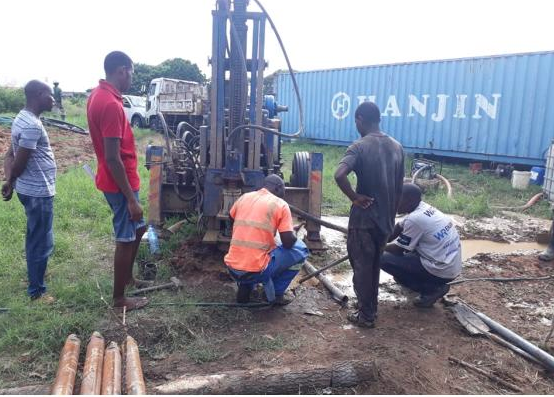
MOZAMBIQUE: Salesian community in Maputo has new borewell for water access thanks to Salesian Missions ‘Clean Water Initiative’
The new borehole ensures that the Salesian College has clean water to improve students’ health and hygiene as well as curb the outbreak of disease.
NEW ROCHELLE, NY (May 12, 2020) The Salesian community in the Luís Cabral neighborhood of Maputo, Mozambique, was able to dig a new borewell to increase water access thanks to funding from Salesian Missions “Clean Water Initiative.” With this first round of funding, Salesian missionaries have been able to complete several activities including identifying a suitable water source, demarcation of the area, drilling and opening of a borewell, and water pressure tests.
The Salesian community is home to the Salesian coordination house, which is the headquarters of the Salesians of Don Bosco for the entire country of Mozambique. The coordination team works and lives there. The community is also home to a Salesian college, which trains 600 students. The college is dedicated to training for teachers who will educate in professional, technical and vocational schools.
The need for a borewell and new water source for the Salesian community is due to the high cost of water supplied by the national network FIPAG (Investment Fund and Heritage of Water Supply). FIPAG also faces water supply capacity problems and has not been able to meet the demand for water. There are several restrictions and breaks in the supply that sometimes last a week. This makes it extremely difficult to run an educational institution with so many students.
Having its own water supply will ensure that the Salesian community will have access to the water supply they need, keep costs low and ensure the quality of water provided to Salesian staff and students. This project is the first phase. Additional funding is needed for an electrical pump and switchboard and other activities for clean water access.
“Salesian communities must have access to safe, clean water for the health and safety of those we serve,” says Father Gus Baek, director of Salesian Missions, the U.S. development arm of the Salesians of Don Bosco. “Improving water access ensures that teachers and students are working and learning in an environment that promotes proper hygiene and has safe drinking water. This reduces the number of waterborne illnesses that can affect those in our schools, keeping them away from important study time.”
Salesian missionaries have been living and working in Mozambique for 110 years, providing education and social development programs for poor youth. The country gained its independence in 1975 but a civil war erupted in 1977 and lasted until peace treaties were signed in Rome in 1992. The civil war left some 60,000 youth with few employment prospects, little training and war being their only education.
Mozambique has made great strides in reducing poverty, according to the World Bank. But with nearly 50 percent of the population still living in poverty, progress has not been fast enough. Poverty is concentrated in rural areas, and even with growth within the country, the regions of Zambezia, Sofala, Manica and Gaza saw an increase in poverty in the 2000s.
More than 70 percent of those living in poverty reside in rural areas and rely on farming and fishing to make a living. The vast majority of the rural population lives on less than $1.25 a day and lacks basic services such as access to safe water, health facilities and schools.
### Contact: [email protected]
